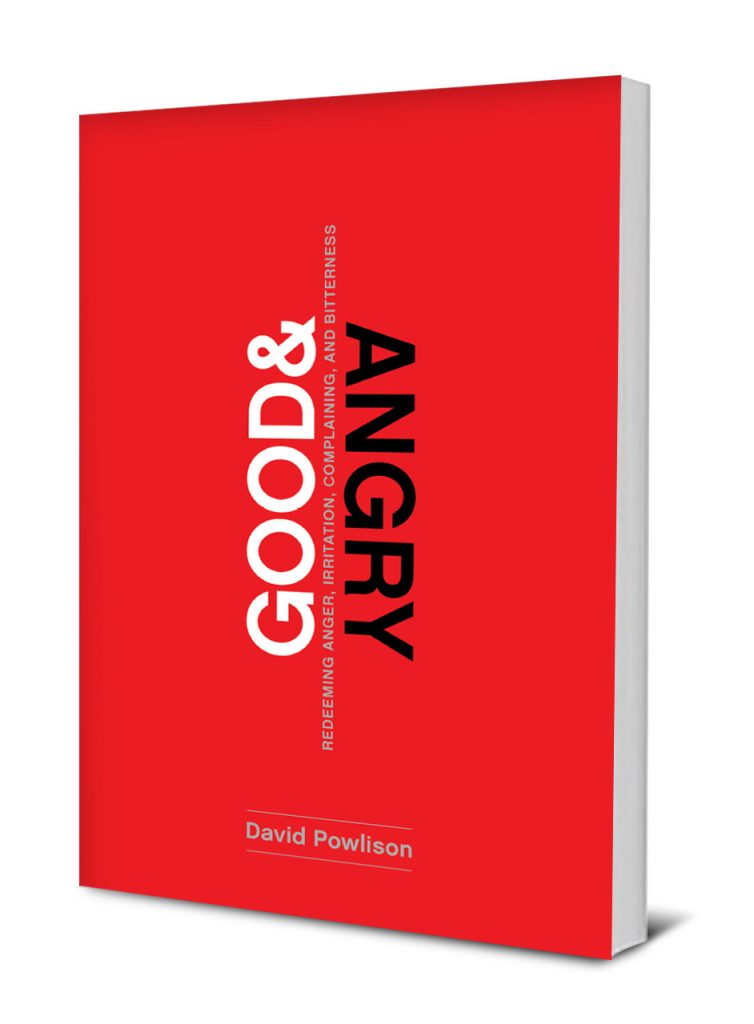We all have firsthand experience with anger gone wrong. We’ve dished it out. We’ve been on the receiving end. We’ve heard and seen others get angry at each other. At some point in each day you are probably affected by some form of anger gone bad—either your own or someone else’s.
Often it’s mild—frustrations, complaining, irritation. Often it’s veiled—judgmental thoughts, passive aggressions. Often it’s buried—hidden from conscious awareness, painted over with pleasantries, anesthetized by distractions, busyness, or mind-altering substances. All too often it’s intense—bitterness, hostility, violence. It’s no surprise that when the apostle Paul lists typical sins, half his list belongs to the anger family (Galatians 5:19–21).
And yet anger done right is a great good. It says, “That’s wrong” and acts to protect the innocent and helpless. It says, “That’s wrong” and energizes us to address real problems. God, who is good and does good, expresses good anger for a good cause. Jesus gets good and angry—in the service of mercy and peace. He is willing and able to forgive us for our anger gone bad. He is willing and able to teach us to do anger right.
But it is hard to sort out the good from the bad in anger, isn’t it? And it’s even harder to change when anger has gone bad. Why are problems that are so common so difficult to solve?
All of us are in this boat. It’s hard to do anger right. Unless you have somehow numbed yourself to the human condition, every one of us struggles with anger. Your struggle with anger (and mine) will last a lifetime, but it can go somewhere good. We can learn to deal with anger differently.
What is anger?
That simple question quickly becomes complex. In the most typical case, you see something wrong or bad happening. When a supposed friend betrays you, that’s wrong, not right. When construction shuts down the highway and you miss an important appointment, that’s bad, not good. You get angry when you experience what happened as a moral offense or an unpleasant frustration. So far, so good. In theory, your anger could be clean and constructive. Yet most often, our anger comes out grubby and destructive in complaining, throwing tantrums, displaying coldness, trying to get “even,” and feeling self-pity. These are typical ways all of us return “evil for evil”—a natural response, for sure, but one that God identifies as the exact wrong response (Romans 12:17–21).
The question is also complex because each of us brings a certain set of associations with us into each angry moment. Particular memories, good and bad experiences, people who’ve hurt us or influenced us, the turmoil of emotions—these create a context that may be far more persuasive than any textbook definition of anger. Your instinctive, personalized definition may or may not be helpful in getting to the bottom of all that anger is.
Consider this analogy. Say the word father, and one woman thinks of a man who is gentle, strong, generous, protective, and reliable. She feels trust and pleasure at the thought. Another woman thinks of a man who was all those things, but he died last year. Her trust and pleasure are infused with grief. A third woman thinks of a man who is still a vicious drunk, betrayer, abuser, and hypocrite. She feels immediate fear, pain, and anger. A fourth woman thinks of a similarly harmful man . . . who died twenty years ago. Dark feelings are still present, but muted and colored “with a sense of regret, of emptiness, even of thankfulness that her life was not destroyed.
The same word yields a completely different starting point for the train of thoughts and feelings. If you are trying to understand what a father is or should be, it’s important to get your starting point out on the table. Only then can you start to think more widely and deeply.
It’s no different with anger. What image or experience comes to mind when you hear the words “He’s angry,” or “She’s angry,” or “I’m angry”? What do you picture taking place? Do you think of a hostile exchange between two people? A particular person’s facial expression, hostile words, and violence? An overwhelming burning inside? The way that you react fearfully to an angry person? An angry crowd of protesters? What is your association?
The Spectrum of Bad Anger
Here are six common wavelengths within the spectrum of bad anger. Perhaps one of these is what first captures your attention.
Irritability is anger on a hair trigger. Do you live or work alongside someone who is easily set off? Are you cranky, grouchy, and testy? (The English language contains such wonderful words for this!)
Arguing is the disagreeable “he said, she said” of interpersonal friction. Anger is the emotion that inhabits interpersonal conflict, and it takes two for a fight. Is quarreling your first association?
Bitterness expresses how anger can last a long, long time. People recycle old hurts and nurse grievances and grudges. They never get over it.
Violence expresses the sheer destructiveness of angry behavior. Anger attacks, hurts, destroys, and even kills, finding pleasure in inflicting pain.
Passive anger hides behind surface appearances and even beneath conscious awareness. As long as it remains undetectable by the person who is angry, it cannot be addressed. But it is not without its side effects—depression, lethargy, and pessimism can all stem from a passive anger toward others.
Self-righteous anger enjoys the empowering sense of grievance, of getting in touch with honest emotion and expressing it freely. It feels good to let it out, and it often gets results.
Each of these six problems matters hugely. Anger flares too quickly, alienates too many relationships, burns too long, causes too much pain, hides too well, and feels too good.
Value Judgments
Anger always makes a value judgment. Anger is always a moral matter. It has rightly been called “the moral emotion” because it makes a statement about what matters. Human beings make moral judgments, therefore human beings do anger. Period. Like God, you come wired to size things up, to feel displeasure at wrong, and to act in order to do something about it.
Would you want to live in a world with no value judgments? Not on your life. When the standard of judgment is accurate and the way of reacting is constructive—then clear-minded, hearty disapproval is one of the best things going. If you were indifferent or approving toward child abusers, terrorists, or cheats, you’d be morally defective. Moral sanity must disapprove of wrong, and that disapproval is the essence of anger.
Every time you get angry, you make your values and point of view explicit. But anger isn’t the only reaction that proclaims what you value. In fact, every time you open your mouth (or don’t open your mouth) you are broadcasting your values to others. This is what is meant, for example, when Jesus said that “every careless word” will be evaluated and that the mouth speaks from what fills the heart (Matthew 12:36; Luke 6:45). Every word you say—including small talk—tells something important about you. What you choose to talk about (or never think of saying) broadcasts what matters to you. Your emotional reactions and your choices always proclaim your values. Stir in a bit of emotion—because you care, because something that matters is going wrong—and you can get the reaction we call anger. Every time you get angry (or don’t get angry) you broadcast what matters to you.
Throughout God and Angry I use the flexible word anger. It naturally will focus on the negative value judgments we make. But always in the background I’ll work within this broader description of our evaluative capacity as human beings. We evaluate everything—ourselves, others, weather, animals, ideas, dinner, God, prices, current events, you name it. Thumbs up or thumbs down. You can’t escape working the way a human being works. Anger simply expresses with particular force and emotion our negative evaluations. Where does the emotional charge come from? The more something matters, the more you care, the more important it is—the more you value something—the more force you’ll pour into your displeasure.
What is anger? It’s the way we react when something we think important is not the way it’s supposed to be.
Excerpted from Good and Angry: Redeeming Anger, Irritation, Complaining, and Bitterness © 2016 by David Powlison. May not be reproduced without prior written permission.
GOOD AND ANGRY: REDEEMING ANGER, IRRITATION, COMPLAINING, AND BITTERNESS
Good and Angry, a groundbreaking book from David Powlison, shows readers how anger is more than a problem to solve. Anger is our complex human response to what we perceive as wrong in a complex world, thus we must learn how to fruitfully and honestly deal with it.






